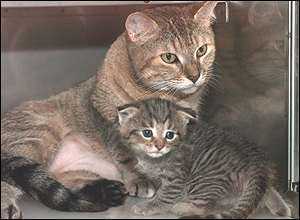
In Scotland, there are an estimated 3,500 Scottish wildcats, representing 100 % of the entire British population. There are 130,000 feral cats, 16 % of the British population.
Wildcat in surrogate birth
From BBC News December 15 th 1999
 The wildcat kitten was born from an implanted embryo
The wildcat kitten was born from an implanted embryo
An ordinary domestic cat has given birth to an African wildcat, in an unusual surrogate birth experiment, researchers revealed on Monday.
Cayenne, a 6-year-old American short-hair cat, gave birth three weeks ago to Jazz, an African wildcat kitten.
The birth is claimed to be the world's first successful inter-species transfer of a frozen embryo.
The Audubon Centre for Research of Endangered Species (Acres) in New Orleans, US, said it hoped to use the method to help save the house cat's rare cousin, which is endangered.
Frozen zoo
The embryo came from Acres' "frozen zoo," a collection of frozen material from threatened animals. It hopes this can be used as a source to replenish a number of rare species.
The success at Acres opens the possibility of using less-rare animals to gestate embryos and free up the rarer animals to produce more sperm and eggs.
"More animals will become extinct in our lifetime than at any other time in the history of mankind," said Ron Forman, chief executive officer of Acres.
"We are developing the technology to freeze and stockpile reproductive material, using common, non-endangered animal surrogates to increase the birth-rate for endangered species."
Wildcats, which look very much like their domestic cousins, are the smallest of the exotic cats.
A previous attempt to use a domestic cat as a surrogate mother at Cincinnati Zoo a number of years ago led to the birth of Noah, a male Indian desert cat. The technique used was similar to the in vitro fertilisation procedures used to produce human 'test tube babies'.
15 th December 1999
 |
 |
| Return to index | Return to Scottish Wildcat |